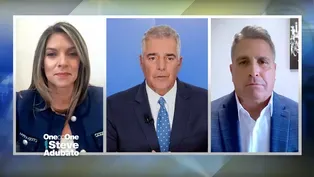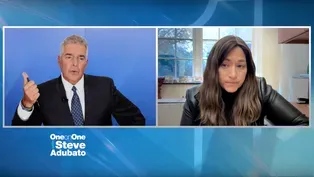One-on-One
Ongoing Staffing Shortages in the Medical Field
Clip: Season 2024 Episode 2666 | 6m 4sVideo has Closed Captions
Ongoing Staffing Shortages in the Medical Field
Dr. Shai Gavi, DO, Chief Medical Officer for Atlantic Health Group, joins Steve Adubato for a conversation about ongoing issues in the medical field, including staffing shortages and hesitancy towards the COVID vaccine.
Problems with Closed Captions? Closed Captioning Feedback
Problems with Closed Captions? Closed Captioning Feedback
One-on-One is a local public television program presented by NJ PBS
One-on-One
Ongoing Staffing Shortages in the Medical Field
Clip: Season 2024 Episode 2666 | 6m 4sVideo has Closed Captions
Dr. Shai Gavi, DO, Chief Medical Officer for Atlantic Health Group, joins Steve Adubato for a conversation about ongoing issues in the medical field, including staffing shortages and hesitancy towards the COVID vaccine.
Problems with Closed Captions? Closed Captioning Feedback
How to Watch One-on-One
One-on-One is available to stream on pbs.org and the free PBS App, available on iPhone, Apple TV, Android TV, Android smartphones, Amazon Fire TV, Amazon Fire Tablet, Roku, Samsung Smart TV, and Vizio.
Providing Support for PBS.org
Learn Moreabout PBS online sponsorship(upbeat music) - We're now joined by Dr. Shai Gavi, who is Chief Medical Officer at Atlantic Health Group.
Good to see you, doctor.
- Thank you.
Good to see you as well.
- The relationship between a patient and their primary care physician is so important because?
- Sure.
Yeah.
It's critically important.
This is usually a longitudinal long-term relationship where the primary care physician is able to really get to understand the patient from the medical side, but also from their social side, their family, their social determinants of health, other family circumstances that would impact their health.
So it's critically important.
- But there is, unless I'm mistaken on this, a real shortage of primary care physicians.
So if that's the case, what advice do you have for viewers watching who are patients and family members who are patients?
- Sure, absolutely.
And yes, you're correct.
In the more recent years post pandemic, there's been shortage of healthcare providers throughout our country.
And so there are different models of care these days.
We do have our physicians, but also nurse practitioners and physician assistants and various models of care to try to meet the needs.
But yes, there is a shortage, but there are some newer models.
- Let me ask you this, everyone in the healthcare community that come on has experienced COVID in a way that's very different than for the rest of us.
Much closer to it, experienced it particularly early on in March, April, May of 2020 and beyond.
How do you believe, or what do you believe the long-term, the most significant long-term impact and implications of COVID are for the hospital/healthcare system, please?
- Sure, absolutely, so it's definitely taken a mental toll on individuals involved in the care of patients during COVID.
So certainly the mental toll has been there.
We've lost a significant number of staff who have left the hospital settings or are dealing with staff shortages and really recreating healthcare post pandemic.
What would that look like?
New staffing models, how do we work post pandemic with the current environment?
So it's had tremendous impact on our staffing, mental health, resilience.
- You know, it's interesting.
At a different competing healthcare system I teach in what is called the Physician Leadership Academy, and we teach a lot about communication and leadership.
And it's not so much doctor patient communication, but it's a physician being a leader of a department, having to run meetings, having to coach and train people, having to deal with conflict, et cetera.
You have been trained in the field of communication as well.
What specifically have you been trained in and how has that helped you as a physician, please?
- Sure, absolutely, so I've done a fair amount of training and communication, and it's a really critically important topic, and even more so now post pandemic, thinking about how do we work with individual team members, patients, and others to really listen and understand their perspectives, to mitigate conflict and differences in perspective and opinions, and making people feel valued.
Identifying emotions, naming emotions, so critically important communication skills to help our teams get through these current times.
- You know, it's interesting, health communication, particularly communication from public health agencies There are millions and millions of people across this country, large numbers in the region where we're viewed.
We're like, what do you mean this vac?
Is it a booster?
Is it a vaccine?
Do I really need it?
Which one is this?
And what about if there's a new variant?
How helpful is it's gonna be?
I'm gonna be sick for a day or two?
Point being, accurate, credible, public health information, whether it's from the CDC or any other entity that we look to for direction, has been questioned by many.
You say what to them right now?
- I'd say, you know, speak to their physician.
Going back to our initial discussion regarding primary care physicians, right?
These are physicians that know our values, know our potential health risks.
So really kind of balancing the risks and the benefits of these vaccines in light of our current state is important and regarding our values as well.
So back to really speaking with physicians, and as you stated, there are good resources like the CDC out there that provide valid up-to-date information.
- Before I let you go, you were a pharmacist professionally before you became a physician.
Why The switch?
- I enjoyed pharmacy, it was a wonderful opportunity and once I started spending some time in the healthcare environment in the hospitals, really fell in love with it more and wanted to be more involved and wanted to learn more.
And going on to medical school and doing research and other things was a great way just to get more involved and help out.
- Dr. Shai Gavi, Chief Medical Officer, Atlantic Health Group.
Good to see you, Dr.
Thanks for joining us.
We appreciate it.
- Thank you.
My pleasure, have a great day.
- You got it.
I'm Steve Adubato, stay healthy.
Thanks for watching us.
We'll see you next time.
- [Narrator] One-On-One with Steve Adubato has been a production of the Caucus Educational Corporation.
Funding has been provided by The Healthcare Foundation of New Jersey.
New Jersey Sharing Network.
Robert Wood Johnson Foundation.
The New Jersey Education Association.
Johnson & Johnson.
The North Ward Center.
The Port Authority of New York and New Jersey.
PSC.
And by New Jersey’s Clean Energy program.
Promotional support provided by NJ.Com.
And by BestofNJ.com.
- (Narrator) New Jersey is home to the best public schools in the nation, and that didn't happen by accident.
It's the result of parents, educators and communities working together year after year to give our students a world class education.
No matter the challenge, because parents and educators know that with a shared commitment to our public schools, our children can learn, grow and thrive.
And together, we can keep New Jersey's public schools the best in the nation.
How Parents and Students Can Better Understand ADHD
Video has Closed Captions
How Parents and Students Can Better Understand ADHD (10m 10s)
Trauma Inflicted Upon Families During COVID
Video has Closed Captions
Trauma Inflicted Upon Families During COVID (10m 45s)
Providing Support for PBS.org
Learn Moreabout PBS online sponsorshipSupport for PBS provided by:
One-on-One is a local public television program presented by NJ PBS













